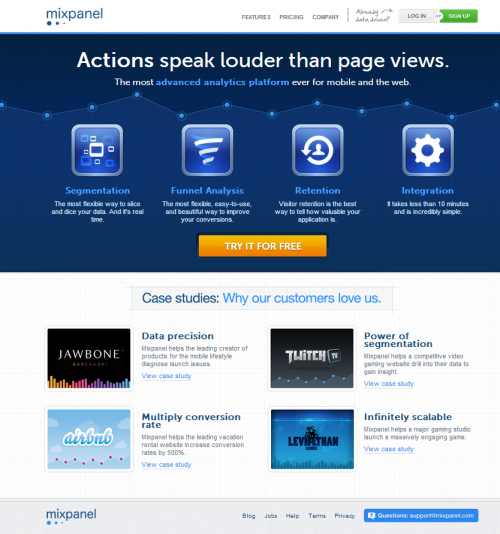Most of us have been frustrated with our analytics software at one time or another. What one program features another program lacks, and larger companies have turned to building their own specialized in-house analytics tools to meet their personalized needs. When Suhail Doshi and Tim Trefren noticed this trend, they decided to do something about it, and Mixpanel was born.
Claiming to be ‘the most advanced analytics platform ever for mobile and the web, Mixpanel takes just ten minutes to completely integrate with any site and offers a full range of analytics tools – many of which you may never have considered before. Earlier today I spoke with Suhail and Tim about their latest projects.
Tell us a little bit about your background and the start-up story behind Mixpanel
Suhail: I co-founded Mixpanel with Tim and we incorporated the company after graduating from Y Combinator in July 2009. I saw that really smart, forward looking companies were starting to build their own in-house analytics tools because nothing in the market gave them the insights they needed. There have never been more companies competing for their customers attention than there are today and the smart companies are using the insights they gain from analytics to get the advantage.
What are some of the projects you are working on right now?
Suhail: We recently launched Engage, a new product that makes it easy for businesses to reach the right customer with the right message at the right time. We are also working on a new way to make it easy for businesses to get more anecdotal insights out of their aggregate data. I believe that understanding how a single person uses a product can unlock valuable insights that are otherwise lost in a flood of data.
Tell us a little bit about the YCombinator experience, what was it like to start up there?
Tim: One of the best parts of Y Combinator is the environment. You’re put in a high pressure situation where you see people hole up for days writing code and achieve these crazy feats. You learn that anything is possible.
Suhail: Have a big impactful vision. Too many entrepreneurs have really tiny visions, like building a to-do list app. Don’t build a to-do list app, change the way people remember things. Once you get going find ways to create early, small successes. Success breeds success.
What is one thing you know now that you wish you knew before launching Mixpanel?
Tim: We should have started working to hire earlier. We underestimated how hard it is to find the right people. Even when we have found good candidates, hiring the right person is still a difficult and nuanced process.

What was the biggest problem you encountered, and how did you overcome it?
Suhail: Half of our YC class instantly died after graduation and we almost met the same fate. We were down to our last potential investor and had been told our business was at best a good side project. When we approached our last chance investor we asked him to be an advisor rather than asking for an investment and then asked him to invest after he had embraced our vision. When you need money, first ask for advice.
What is one thing that you do on a daily basis to grow as an entrepreneur?
Suhail: Personally, I focus on building parts of the team that I have no experience in. As a team, each week we have everyone at Mixpanel focus on a singular goal, so we tackle a new challenge together and learn from it.
How is running a successful tech company different than what you thought it would be?
Suhail: You think that you get to work on awesome stuff and run a company, but good founders give the awesome stuff to people on their team and take on the basic tasks that no one wants to do. We’re the founders and the janitors.
What was the best entrepreneurial advice you have ever been given and by whom?
Tim: While we were at YC Paul Bucheit said appeal deeply to a small audience, then broaden your focus rather than be all things to all people right from the beginning. It’s a lot easier to make an impact if you know who you are focusing on.
What 3 pieces of advice would you offer prospective founders about knowing when they have an idea worth making a leap for?
Suhail: Before we started Mixpanel I wanted to build a gaming company and when I worked on it I went to bed every night at midnight. When I scrapped that idea and started working on Mixpanel I started saying up until 3am every night. I just naturally started working harder when I found the thing that got me excited. You also need to be fearless and learn that in business no does not mean no, it means not yet–keep trying.
How can our community get in touch with you?
Check out our blog or follow us on twitter. Email us at support@mixpanel.com if you’d like to get in touch directly.








